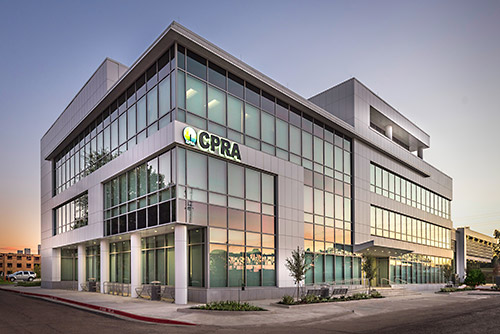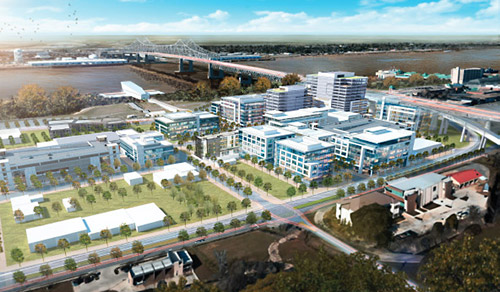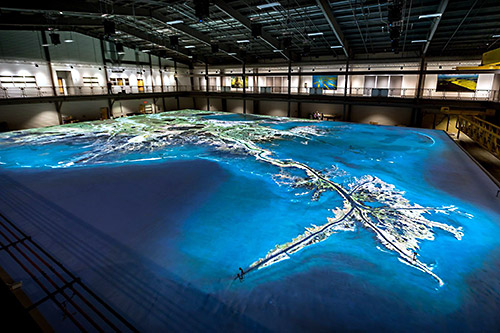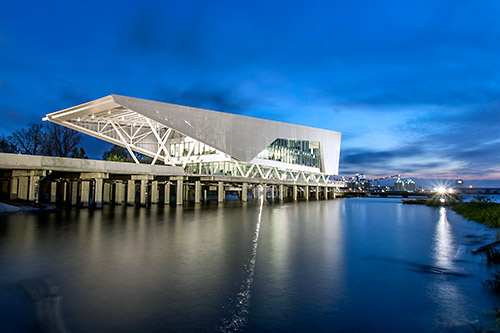The Water Campus, a world-class research center devoted to the study of coastal restoration and sustainability, opened in 2018 in Baton Rouge, Louisiana. When all phases of construction are complete, the 35-acre, $600-million campus will house more than 1.6 million square feet of collaborative research facilities and commercial space. Scientists here will study coastal threats and develop innovative solutions to protect these areas from the growing risks posed by climate change and rising sea levels.
The concept for the project was developed by the Baton Rouge Area Foundation, in response to severe coastal land loss issues impacting Louisiana. Political, academic, and nonprofit leaders took several post-Katrina trips to the Netherlands to learn water-management best practices from the Dutch — some of the foremost experts in the field. The Louisiana team quickly realized that coastal and deltaic solutions were needed around the world. Seeing how a state-of-the-art research center could leverage the city’s deep knowledge and expertise in water management and generate international collaboration and acclaim, the foundation teamed up with congressional, state, and local officials to develop a plan for the campus.
After Hurricane Katrina, U.S. Senator Mary Landrieu (D-LA) asked the Baton Rouge Area Foundation to explore how Louisiana could rebuild its coastal areas in more resilient ways. This led to the idea of creating an independent science organization to lure the best coastal scientists to Baton Rouge. This resulted in the creation of The Water Institute of the Gulf to generate the science needed to support the state’s $50 billion coastal master plan.
“The foundation also decided the institute could become the centerpiece of another big idea — an international gathering place for scientists across many disciplines to work collaboratively to develop meaningful solutions to our most pressing coastal and deltaic challenges,” says Justin Ehrenwerth, president and CEO of the Water Institute of the Gulf. “This gathering place — The Water Campus — provides public and private organizations that are focused on water resource management, deltaic living, coastal restoration, and flood protection with a living laboratory in which to research and test innovations that can help coastal and deltaic communities around the world.”

“The innovative partnership among public and private entities was critical to the success of the Water Campus,” adds Mike Bruce, senior principal with Stantec, an engineering services firm that helped with infrastructure planning, design, and permitting and was the first private company to move to the Water Campus. “Funding for infrastructure has come primarily from the city and state, with the remainder coming from private donations. Although the overwhelming need for this research helped create this partnership, the foundation was the driving force that brought this concept to Baton Rouge and has kept it on track since its inception.”

A Promising Future
Research conducted at The Water Campus will benefit climate change prevention strategies in the U.S. and around the world. With researchers from a dozen different countries — including Vietnam, the Netherlands, and several South American and Pacific nations — the Water Institute of the Gulf maintains a global perspective and plans to apply breakthroughs developed at the LSU Center for River Studies and The Water Campus to other global regions.

“In addition,” adds Adam Knapp, president and CEO of the Baton Rouge Area Chamber, “the synergy that exists among the Coastal Protection and Restoration Authority, Water Institute of the Gulf, and LSU’s research efforts makes for an incredible incubator for the private sector. Our goal is to become the best location in the country, and eventually in the world, for firms with an interest in the water sector. As such, we are confident The Water Campus will be a magnet for innovation, private-sector investment, and relocation.”




